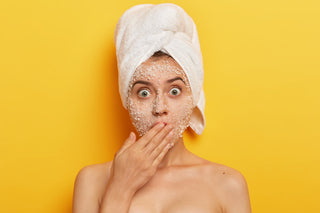Skincare is like a fascinating journey towards achieving radiant, healthy skin. It's akin to a well-planned strategy, and in this journey, dead skin cells play a crucial role, often underestimated but vital for the health of your skin. This blog explores these seemingly passive soldiers, uncovering their important role and the potential issues that can arise if we overdo their removal.
The Skin's Protective Guardians
Picture the surface of your skin as a strong fortress. The outermost layer, mostly made up of dead skin cells, acts like vigilant guards. These silent protectors form what's called the stratum corneum, working as a protective shield for your living skin cells against external threats. They defend your skin against harsh UV rays, the damaging effects of pollutants, and potential intruders like harmful microbes. All the while, they maintain the overall structure and health of your skin.
Natural Exfoliation
Nature has a well-organized process for changing these guards. As skin cells age, they undergo a programmed cell death (apoptosis), making way for fresh replacements. This orderly cellular transition keeps your skin structurally sound, much like a well-executed troop rotation in a military operation. On average, this process of skin cell turnover takes about 28 days (about 4 weeks), but it can vary depending on your age and skin type.
The Risks of Over-Exfoliation
In the world of skincare, balance is vital. However, excessive exfoliation can disrupt this well-structured defense, leading to less-than-ideal outcomes. Here are potential issues when you overdo exfoliation:
- Heightened Sensitivity: When you over-exfoliate, it's akin to stripping off essential layers of your skin's protective barrier, rendering your skin more vulnerable to external aggressors. Your skin becomes hypersensitive, expecting threats at every turn. The result? Discomfort and irritation, similar to a defense mechanism on high alert.
- Excessive Dryness: The outermost layer of your skin plays a crucial role in maintaining your skin's moisture balance. Over-exfoliation disrupts this balance, making your skin parched and in dire need of nourishment, leading to excessive dryness, flakiness, and roughness.
- Unwanted Breakouts: Over-exfoliation can lead to more breakouts. When your skin's protective barrier is compromised, it can respond with an overproduction of sebum (natural oils), clogging pores and ultimately leading to acne. Your skin's response to over-exfoliation is similar to a military unit that, due to disorganization, ends up attacking itself rather than the intended enemy.
- Accelerated Aging: Over-exfoliation can accelerate the aging process by breaking down essential skin components like collagen and elastin, crucial for maintaining youthful, supple skin. This is akin to losing your skin's natural defense against the signs of aging. When these crucial components are broken down, your skin becomes more prone to wrinkles and sagging, giving it an aged appearance.
Balancing Act
Just like a well-coordinated military mission requires precise management, your skincare routine thrives on harmony. Each skin type has its unique needs. Oily skin may benefit from more frequent exfoliation, while sensitive and dry skin require a gentler approach.
The natural role of dead skin cells, as the vigilant guardians of your skin, is to protect and maintain the health of your skin. Similar to a well-planned military strategy, exfoliation is an important part of your skincare routine. However, it should be approached with care and moderation. Excessive exfoliation can result in various skin issues, potentially hindering your quest for radiant, healthy skin. Embrace the beauty of balance and allow your skin's guardians to stand strong. It's a well-thought-out operation that ensures your skin remains strong, luminous, and resilient.
Image by wayhomestudio</a> on Freepik

